Unit 1 thinking as a hobby教学提纲
- 格式:ppt
- 大小:2.61 MB
- 文档页数:76
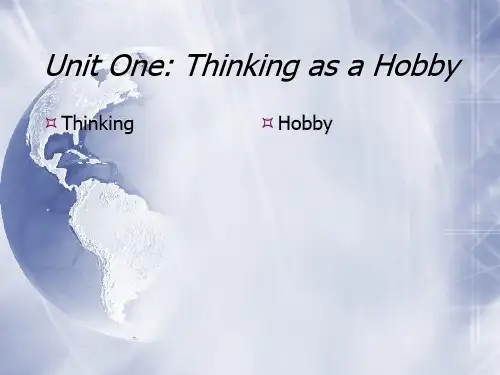
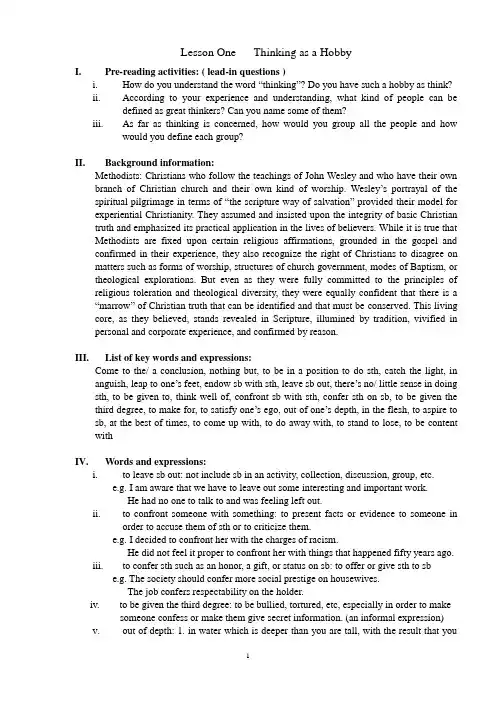
Lesson One Thinking as a HobbyI.Pre-reading activities: ( lead-in questions )i.How do you understand the word “thinking”? Do you have such a hobby as think?ii.According to your experience and understanding, what kind of people can be defined as great thinkers? Can you name some of them?iii.As far as thinking is concerned, how would you group all the people and how would you define each group?II.Background information:Methodists: Christians who follow the teachings of John Wesley and who have their own branch of Christian church and their own kind of worship. Wesley’s portrayal of the spiritual pilgrimage in terms of “the scripture way of salvation” provided their model for experiential Christianity. They assumed and insisted upon the integrity of basic Christian truth and emphasized its practical application in the lives of believers. While it is true that Methodists are fixed upon certain religious affirmations, grounded in the gospel and confirmed in their experience, they also recognize the right of Christians to disagree on matters such as forms of worship, structures of church government, modes of Baptism, or theological explorations. But even as they were fully committed to the principles of religious toleration and theological diversity, they were equally confident that there is a “marrow” of Christian truth that can be identified and that must be conserved. This living core, as they believed, stands revealed in Scripture, illumined by tradition, vivified in personal and corporate experience, and confirmed by reason.III.List of key words and expressions:Come to the/ a conclusion, nothing but, to be in a position to do sth, catch the light, in anguish, leap to one’s feet, endow sb with sth, leave sb out, there’s no/ little sense in doing sth, to be given to, think well of, confront sb with sth, confer sth on sb, to be given the third degree, to make for, to satisfy one’s ego, out of one’s depth, in the flesh, to aspire to sb, at the best of times, to come up with, to do away with, to stand to lose, to be content withIV.Words and expressions:i.to leave sb out: not include sb in an activity, collection, discussion, group, etc.e.g. I am aware that we have to leave out some interesting and important work.He had no one to talk to and was feeling left out.ii.to confront someone with something: to present facts or evidence to someone in order to accuse them of sth or to criticize them.e.g. I decided to confront her with the charges of racism.He did not feel it proper to confront her with things that happened fifty years ago.iii.to confer sth such as an honor, a gift, or status on sb: to offer or give sth to sbe.g. The society should confer more social prestige on housewives.The job confers respectability on the holder.iv. to be given the third degree: to be bullied, tortured, etc, especially in order to make someone confess or make them give secret information. (an informal expression) v.out of depth: 1. in water which is deeper than you are tall, with the result that youcannot stand up but have to swim. 2. in a situation that is much too difficult for sb to be able to cope with.vi.at the best of times: used when you are making a negative or critical comment to emphasize that it is true even when the circumstances are as favorable as possible. vii.To stand to lose or gain sth: to be in a position in which you are likely to lose or gain.viii.There is no or little sense in doing sth: nothing useful would be gained by doing it.e.g. There’s no sense in making people unhappy.I can’t see much sense in what they’re doing.There would be little sense in analyzing the reasons for our defeat. It’s a matter ofluck.。
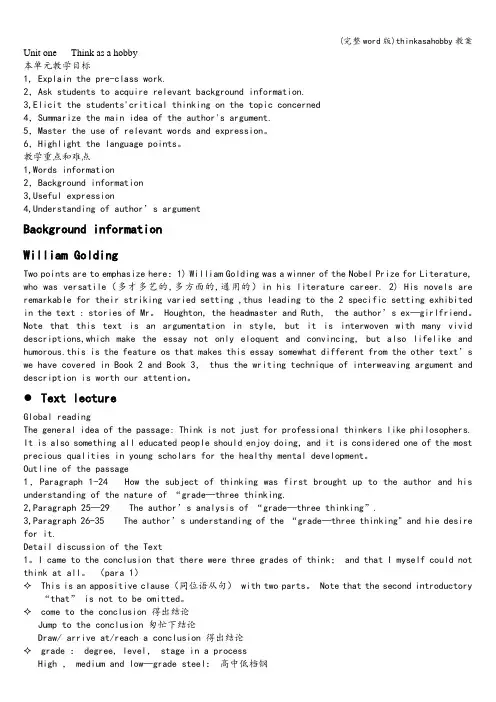
Unit one Think as a hobby本单元教学目标1, Explain the pre-class work.2,Ask students to acquire relevant background information.3,Elicit the students'critical thinking on the topic concerned4,Summarize the main idea of the author's argument.5,Master the use of relevant words and expression。
6,Highlight the language points。
教学重点和难点1,Words information2,Background information3,Useful expression4,Understanding of author’s argumentBackground informationWilliam GoldingTwo points are to emphasize here:1) William Golding was a winner of the Nobel Prize for Literature, who was versatile(多才多艺的,多方面的,通用的)in his literature career. 2) His novels are remarkable for their striking varied setting ,thus leading to the 2 specific setting exhibited in the text : stories of Mr。
Houghton, the headmaster and Ruth, the author’s ex—girlfriend。
![[综合英语]课件_Lesson1-ThinkingasaHobby资料](https://uimg.taocdn.com/7666cc036f1aff00bfd51e49.webp)

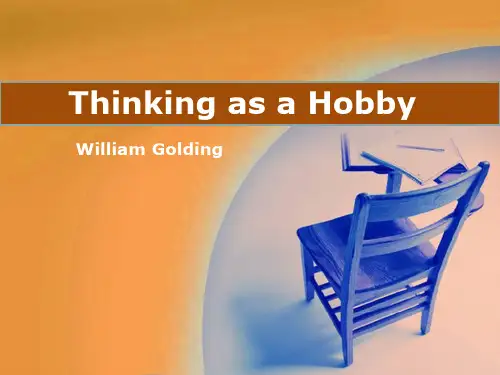

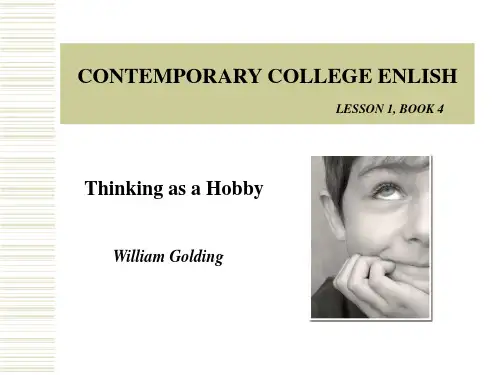
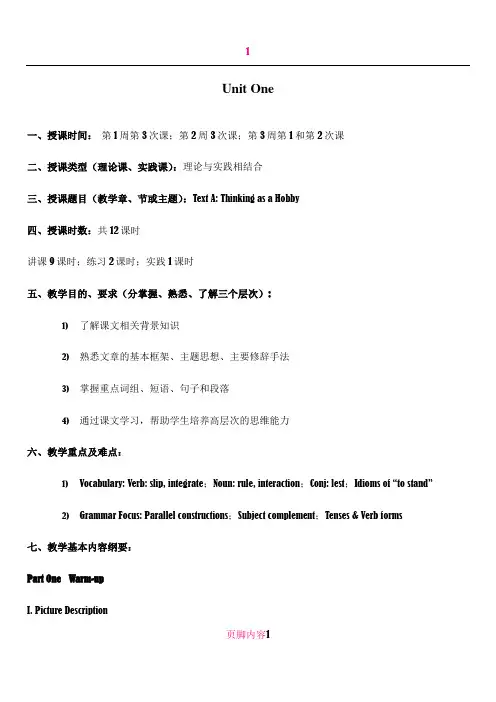
Unit One一、授课时间:第1周第3次课;第2周3次课;第3周第1和第2次课二、授课类型(理论课、实践课):理论与实践相结合三、授课题目(教学章、节或主题):Text A: Thinking as a Hobby四、授课时数:共12课时讲课9课时;练习2课时;实践1课时五、教学目的、要求(分掌握、熟悉、了解三个层次):1)了解课文相关背景知识2)熟悉文章的基本框架、主题思想、主要修辞手法3)掌握重点词组、短语、句子和段落4)通过课文学习,帮助学生培养高层次的思维能力六、教学重点及难点:1)Vocabulary: Verb: slip, integrate;Noun: rule, interaction;Conj: lest;Idioms of “to stand”2)Grammar Focus: Parallel constructions;Subject complement;Tenses & Verb forms七、教学基本内容纲要:Part One Warm-upI. Picture Description页脚内容1II. Quotations on ThinkingIII. What Is Your Story?Part Two Background InformationI.A uthorSir William Gerald GoldingThe Author’s BackgroundWilliam Golding’s main worksII.Rodin’s ThinkerPart Three Text AppreciationI. Text AnalysisStructureGeneral Analysis: Some questions on general understanding of the text; The summary of the characteristics of the three grades of thinking.Further Questions on AppreciationII. Writing Devices1. Metonymy2. Synecdoche页脚内容23. Irony4. Hyperbole5. Simile6. MetaphorIII. Sentence ParaphraseWord Building1. Prefix—hind2. Suffix— -ette3. Derivative:4. Suffix— -ferGrammar1.Parallelism2. The Use of ComplementPart Five Extension—Quiz八、教学方法和措施:1、以学生为主体,教师为主导,课堂上开展以任务为中心的形式多样的教学活动,在加强基础训练的同时,采用启发式、讨论式、发现式和研究式的教学方法,充分调动学生的积极性。
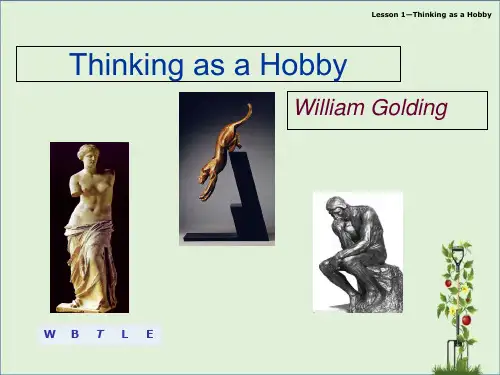
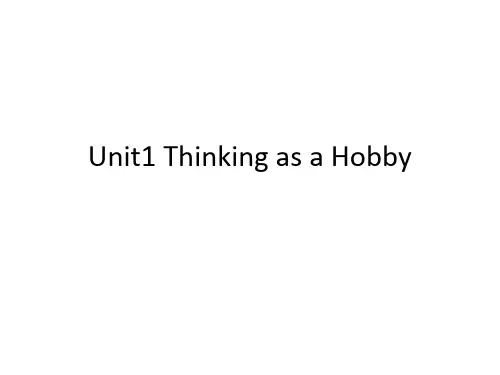
基础英语4课程教案Unit 1 Thinking as a Hobbyby William GoldingTeaching Objectives1. Master the key words, phrases and some useful sentence patterns in the text.2. Get familiar with rules of word formation,grammatical points and understand the structure ofthe text3. Get to know something about the author and the three grades of thinkingTeaching ProcedurePart I Background Information1. About the author -- Sir William Gerald Golding(September 19, 1911—June 19, 1993)He was an English novelist, poet and winner of Nobel in Literature:“for his novels which, wit h the Perspicuity(睿智)of realistic narrative art and the diversity and universality of myth, illuminate the Human condition in the world of today.”His work is characterized by exploration of 'the darkness of man's heart', deep spiritual and ethical questions. Golding's view is pessimistic: human nature is inherently corruptible and wicked.His first novel, Lord of the Flies 《蝇王》(1954), dealt with an unsuccessful struggle against barbarism(野蛮主义)and war, thus showing the ambiguity(不确定性)and fragility (脆弱性)of civilization. It has also been said that it is an allegory(寓言) of World War II.2. Brief Introduction to the TextThe author’s use of the word “hobby” is interesting. By using this word he means that thinking is not just for professional thinkers like philosophers. It is something all educated people should enjoy doing. This special interest is often referred to as “idle curiosity”, and it is considered one of the most precious qualities in young scholars. Students should play with ideas the way they play with balls. Both are important for their healthy development, one mental, and the other physical.The essay can be neatly divided into three parts. The first part tells us how the subject of thinking was first brought up to the author and how he came to understand the nature of what he calls “grade-three thinking”, which, he discovered, was no thinking at all, but a combination of ignorance, prejudice and hypocrisy. Unfortunately, according to the author, most people belong to this category.The second part de als with “grade-two thinking”. People who belong to this category can detect the contradictions of grade-three thinkers’ beliefs. They can see their ignorance, prejudice, hypocrisy and lack of logic, which gives them great delight and satisfies their ego. However, grade-two thinking has nothing constructive to offer. It destroys without the power to create. Therefore the satisfaction it brings the thinker is limited and does not last. The answer to this lies in the third part in which the author discusses the definition of “grade-one thinkers” —people who set out to find the truth and get it.It would be interesting to ask ourselves which of the three categories we belong to, and if, for some reason, we are not yet grade-one thinkers, whether we have any need or wish to move up to the next grade.The author does not say explicitly what coherent system of thought he has finally developed which makes him a grade-one thinker. But he has given us very broad hints. Obviously his thinking is based on high moral standards and is opposed to such things as big business, centralized government, wars, armies, heady patriotism, dishonest politicians, etc. which he regards as mere trifles or pointless actions. We can also infer from his sarcastic description of those historical events and political figures where he stands in religion and politics.Part II. Questions for Discussion1. What is this essay talking about?2. What do the three statuettes symbolize? What effect do the boy’s descriptions have?3. How did the author describe the following figures to demonstrate his analyses of differentgrades of thinking?Headmaster Me, the boy A pious lady Ruth Mr. HoughtonBritish Prime Minister American politicians Me, the authorPart III. Detailed Discussion of the Text1. nothing but(p2): nothing except; only-- His parents care nothing but his scores at school.-- One was a lady wearing nothing but a bath towel.2. lest (p2):for fear that; in order to make sure that sth. will not happen-- He hide behind the curtain lest the professor (should) see him.-- She turned pale when her son came out of the study lest he (should) have heard what she had said.3. farther: v. further-- After graduating from Fu Dan University with the bachelor degree, he went abroad to seekfurther study.4. delinquent adj.&n. (p3) : (person, especially the young) doing wrong; failing to perform a duty-- juvenile delinquent-- delinquent children-- the problem of juvenile delinquency5. if anything(P4) :on the contrary-- Your suggestion did not encourage him. It, if anything, discouraged him.-- He is not known for his generosity. He is, if anything, quite miserly.6. confront sb.with sth.(vt.) (p24): to oppose sb. or bring sb. to sth.-- I confronted him with my suspicions, and he admitted everything.(对质)-- The customers are confronted with a bewildering amount of choice.-- We must confront the future with optimism.(勇敢面对)7. get sth. to thought(p24)--I no longer dismiss lightly a mental process which for nine tenths of the population is the nearest they will ever get to thought.Meaning: I no longer consider the way grade-three thinkers unimportant because they account for nine-tenths of the people and therefore have great power. Now I know that ignorance, prejudice and hypocrisy are very powerful enemies.8. confer v. (p25)1) give or grant-- The president of this university will confer bachelor degree on you after you complete your four-year study here.2) consult or discuss-- He conferred with his lawyer on/about the investment project.9. convert v. & n.--They have tried to convert him from atheism to Methodist.-- His convert (n.) to socialism is not easy.10. She claimed that the Bible was literally inspired (Pa.26)A true historical record; a factual accou nt of God’s divine plan and prophecies.This is the belief of fundamentalists.11. flag (vi.)(p26): begin to lose enthusiasm and energy; to decline in interest-- Argument flagged: argument became dull because Ruth did not know how to respond.-- His horse is flagging.-- The country’s economy continued to flag.12. for my money: I bet, I believe, in my opinion13. be given the third degree (p28): Be severely questioned or interrogated14. make for sb./sth. (p.29)1) contribute to; tend towards-- Frequent exposure to idiomatic English, such as VOA makes for your study at university.2) head for 走向,向某个方向移动-- It is late. We’d better make for home.3) charge at, rush towards 袭击,攻击,冲向-- The bull suddenly made for the girl in red and everybody was shocked.14. few and far between (p30) 相隔很久才发生的; 彼此相距很远;稀少Black and blue 遍体鳞伤Fair and square 公正,正大光明Hale and hearty 精神充沛, 老当益壮Safe and sound 完好无损的Dead and gone 已死去的Cut-and-dried 已成定局的Meek and mild 温顺的Fair and square 光明正大的15. aspire (p.30) vi. +for/to/after : be filled with high ambition-- Do you aspire after knowledge?-- The more power they have, the more they aspire to it.-- English majors in non-English speaking countries aspire to abandon their native accents and speak pure English.-- What do you aspire for at present?16. go too far/carry sth. too far:(p.33): go beyond the limits of what is considered reasonable-- You have gone too far in saying that you’d rather break with the family.Go far:1) (of person) : be successful; do much-- He is clever and intelligent, and will go far.2) (of money) buy goods, services, etc.-- A hundred does not go so far as it did ten years ago.Language points1. Rodin’s Thinker(Pa.3)This is the most famous piece of art by the French sculptor August Rodin. It is said to be thestatue that most clearly shows the abstract idea of thinking. The thinker is pondering so intensely that his toes are tightly clutching the ground.2. I was not integrated. I was, if anything, disintegrated.integrated: forming a part of a harmonious groupdisintegrated: Here, it is used by the author to mean the direct opposite of “integrated”, and therefore means some kind of a trouble-maker.3. Nature had endowed the rest of the human race with a sixth sense and left me out.a sixth sense: a keen intuitive power. Here, the author means the ability to think.to endow sb with sth: to provide sb with a natural quality or talent-- She is one of those lucky women who are endowed with both a sharp brain and great beauty.-- God has not endowed him with much humor.The whole sentence means: Everybody, except me, is born with the ability to think.4. Or was there more sense in drinking than there appeared to be? But if not, and if drinking were in fact ruinous to health—and Mr. Houghton was ruined, there was no doubt about that—why was he always talking about the clean life and the virtues of fresh air?Pay attention to some variations of the “There + be” pattern such as:There seems to be…; There appeared to be…; There are supposed to be…;the clean life: It normally refers to a life without vices or moral sins.the virtues of fresh air: the advantages of fresh airMr. Houghton obviously did not practice what he preached. He was a hopeless alcoholic, which had ruined his health, and he obviously did not like outdoor life. Yet he kept talking about a clean life and the virtues of fresh air.5. You could hear the wind, trapped in his chest and struggling with all the unnatural impediments.His body would reel with shock and his face go white at the unaccustomed visitation. He would stagger back to his desk and collapse there, useless for the rest of the morning.struggling with all the unnatural impediments: The fresh air had to struggle with difficulty to find its way to his chest because he was unaccustomed to this.His body would reel and his face go white: He would stagger or be thrown off balance, and his face would go white.6. Through him I discovered that thought is often full of unconscious prejudice, ignorance and hypocrisy. It will lecture on disinterested purity while its neck is being remorselessly twisted toward a skirt.Through him I discovered that what people call thought is often full of prejudice, ignorance and hypocrisy.Note here that the pronoun “it” stands for “thought” in grammar, but actually refers to Mr. Houghton. The word “skirt” stands for girls in general. It is a common figure of speech called metonymy in which an idea is evoked or named by means of a term-- The world is watching closely what the White House will do next. (The White House stands for the American government.)-- Democracy favors the vote rather than the bullet. (V ote stands for elections, and bullet stands for military solution.)-- They have no intention of turning their swords into ploughs. (Sword stand for war and plough for peace.)-- Political power grows out of the barrel of a gun. (Mao Zedong)7. It set me watching the crowds cheering His Majesty the King and asking myself what all the fuss was about, without giving me anything positive to put in the place of that heady patriotism. But there were compensation.•It made me watch people shouting in joy and support of the King and wonder what this senseless excitement was all about although I did not have anything good to replace this exciting or intoxicating patriotism. But I had my reward (I did get something out of it.).•to cheer: to shout in praise, approval and support•His Majesty the King: It is used as a title in speaking of a sovereign monarch.•Also: Your Majesty (when speaking to a sovereign monarch); Her majesty the Queen •fuss: too much attention to or uncalled-for excitement over things that are unnecessary and unimportant•to put in the place of: to replace•heady: inclined to go to your head and make your intoxicated (i.e. a heady trend; heady days; heady success)•compensation: pay, reward, sth that compensates for your loss, service or effort8. I slid my arm around her waist and murmured that if we were counting heads, the Buddhists were the boys for my money. She fled. The combination of my arm and those countless Buddhists was too much for her.•If we were counting heads: if we were talking about the number of people who believe in thisthe Buddhists were the boys for my money: I would bet on the Buddhists; I believe the Buddhists are greater in number•too much for her: more than she could accept or bearPart IV GrammarThe summary of the characteristics of the three grades of thinking教学反思:1.该单元书后练习中,“being”的用法较灵活,应给予学生更充分的时间去消化,特别是有些语法基础差的学生在做翻译练习的时候稍显吃力。